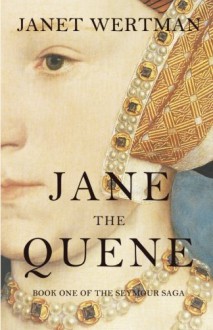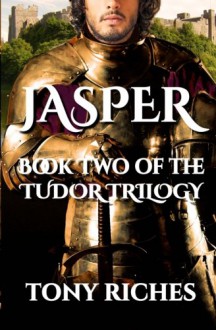If you are still on Goodreads....and if you're interested in reading one of my books as part of a group....Plantagenet Princess, Tudor Queen is the September selection for Tudor History Lovers!

If you are still on Goodreads....and if you're interested in reading one of my books as part of a group....Plantagenet Princess, Tudor Queen is the September selection for Tudor History Lovers!


I enjoy the story of an unsung hero (or heroine), and few people fit that bill better than Jane Seymour. Known chiefly for being the wife that managed to bear Henry VIII a son, I was intrigued to discover how an author would give us a more expansive picture of this quiet queen.
In addition to her short reign, Jane was and continues to be overshadowed by her scandalous predecessor. How exactly Jane felt about Anne Boleyn is not really known, but this novel dealt with their relationship in a believable way. Jane served her cousin Anne as lady in waiting after watching her displace Henry's first queen, Catherine of Aragon. There is little love lost between the women, yet Jane still feels a proper amount of guilt over the harsh way Anne is removed from the picture.
Jane is dutiful and submissive, the antithesis of Anne, which Henry craves deeply after the wearying years of chasing and coping with his second wife. Eager to gain any husband at all, Jane is shocked to discover that the king is drawn to her quiet piety (though one must question the piety of one who sets out to steal another's husband upon learning that he may be tempted). Their romance is slow and chaste, again in direct contrast of Henry's lust-driven courtship of Anne.
In order to see both sides of Henry VIII, the author splits scenes between Jane's point of view and that of Thomas Cromwell. With Jane, we see Henry's softer side, his desire for peace and devotion, and his need for a dependable wife like Jane. From Cromwell, we see a man who quickly turns on friend or spouse as soon as they have displeased him and the extent to which Henry is willing to go to rid himself of one he has grown tired of. Both Jane and Cromwell are portrayed in a believable way that demonstrates their strengths and weaknesses. No one in this story is all good or pure evil.
Important historical facts and events are woven seamlessly into this novel as testament to the author's tireless historical research and desire to create a story that is as realistic as possible while shedding light on an often overlooked queen of England. I look forward to reading the rest of Wertman's planned Seymour trilogy.

I started reading this book and was somewhat confused. Aelfgifu? Isn't that Canute's harridan wife from the north who tries to ruin everything for Emma? How can she be enjoying a romantic moment with her husband or - heaven forbid! Making Emma out to be the evil one?
This unique perspective on King Canute's rival wives may have thrown me for a loop after reading so many positive portrayals of Emma, but that is also exactly what I love about historical fiction. Just as Richard III was made a hero in Sunne in Splendour or Thomas Cromwell made to shine in Wolf Hall, Aelfgifu is a heroine we can feel empathy for in Evans' Northern Queen.
I'm glad that I read this book, because, though I try to keep in mind that we don't know all that we think we do about historical figures, Aelfgifu is one whom I have never considered another side of. The idea that she may have truly loved Canute never really crossed my mind. Any time I am forced to reevaluate my perspective and peer into another possible view of history, I am grateful.
Aelfgifu's role keeps her on the sidelines of events, which makes her story one of a woman who thought to be queen but in reality is a woman often left waiting to hear news from others. This is a difficult way to write while keeping the story moving along, and Evans does an admirable job of it.
If you've ever wanted to see Emma's power struggle from the other side, this is the book for you.
Since you all have been so wonderful with input regarding book covers, titles, marketing images, and everything else, I thought I would solicit your advice once again. I am discovering that it is difficult to continue researching & writing while marketing existing books! I feel like I need two of me. Anyway, here are my current conundrums.
Series title - Since Plantagenet Princess Tudor Queen has sparked a trilogy, I need a series name in order to tie them together on Goodreads & Amazon. I've used 'Rise of the Tudors' on Amazon simply to create a connection between the two existing books, but I don't really love it (and it's used in other titles/series). I would have loved something to do with the Plantagenet remnant, except that the third book is about Mary Tudor. So, ideas?
New book name - I have an entire page filled with potential names for my Mary Tudor book, which is at this point mostly a pile of notes. I would like something that makes it clear that this is a positive look at Mary without turning off those who are adamant about her being 'Bloody Mary'. Some of my favorites so far:
Queen of Regrets
Tragic Queen
Long Awaited Princess
Cursed Queen
Forgotten Queen
Daughter of the King
I considered some of the same words with 'Reign of....' but the other titles describe the women featured, so this one probably should too. Any thoughts, preferences, suggestions?
I'm also attempting to streamline and increase the effectiveness of my time spent on social media. I don't have an email list, but am thinking about writing a 'newsletter' type blog post each month where I could recap blogs, highlight reviews, & mention other book news. Does this sound worthwhile, like something you would read? I've also added a page to my blog with links to other interviews & articles I've done. Any feedback is appreciated!

I have read several other novels by Tony Riches, including the first in this series, Owen, so I knew what to expect in terms of writing style. Riches creates his stories the way I like to see historical fiction written, by researching his topic thoroughly and then creatively filling in the gaps. I particularly enjoyed the Author's Note, where Riches' enthusiasm for following the footsteps of Jasper Tudor is clear in his description of his travels and research.
If the Tudor era seems overdone, you may appreciate that this author is looking at some historical figures who were vital to the founding of the Tudor dynasty yet have not had much written on them. Rather than featuring Henry VIII and his gaggle of wives, Riches' trilogy features the men who gave the dynasty it's name. Owen, in the first book, makes a vital connection between the Tudors and England's royal family when he married the widowed queen, Catherine of Valois, who gave birth to sons who were the king's half-brothers. In this second book, the story of one of those sons, Jasper, takes over.
Jasper's brother, Edmund, may have been the one with a story to tell here if he had not tragically died while his exceptionally young wife was pregnant. Margaret Beaufort probably needs no further introduction, and she is portrayed as the strong and devout woman that she undoubtedly was in this novel. She leans upon her brother-in-law, Jasper, when she is left a 13 year old widow and mother in a country being torn apart by civil war.
What stands out most about this novel is Jasper's failures. I think we tend to think of him as Henry Tudor's greatest supporter (which he was), and he is given much credit for Henry's rise. He deserves most of this, of course, but there were many others who made victory possible, and many of those others had not lost and fled from battle nearly the number of times Jasper Tudor had. It makes the outcome of Bosworth Field even more outrageous.
The declaration of Henry as king is where this story ends, though I am certain we will see much more of Jasper in the final installment of this trilogy, Henry, due out next year.